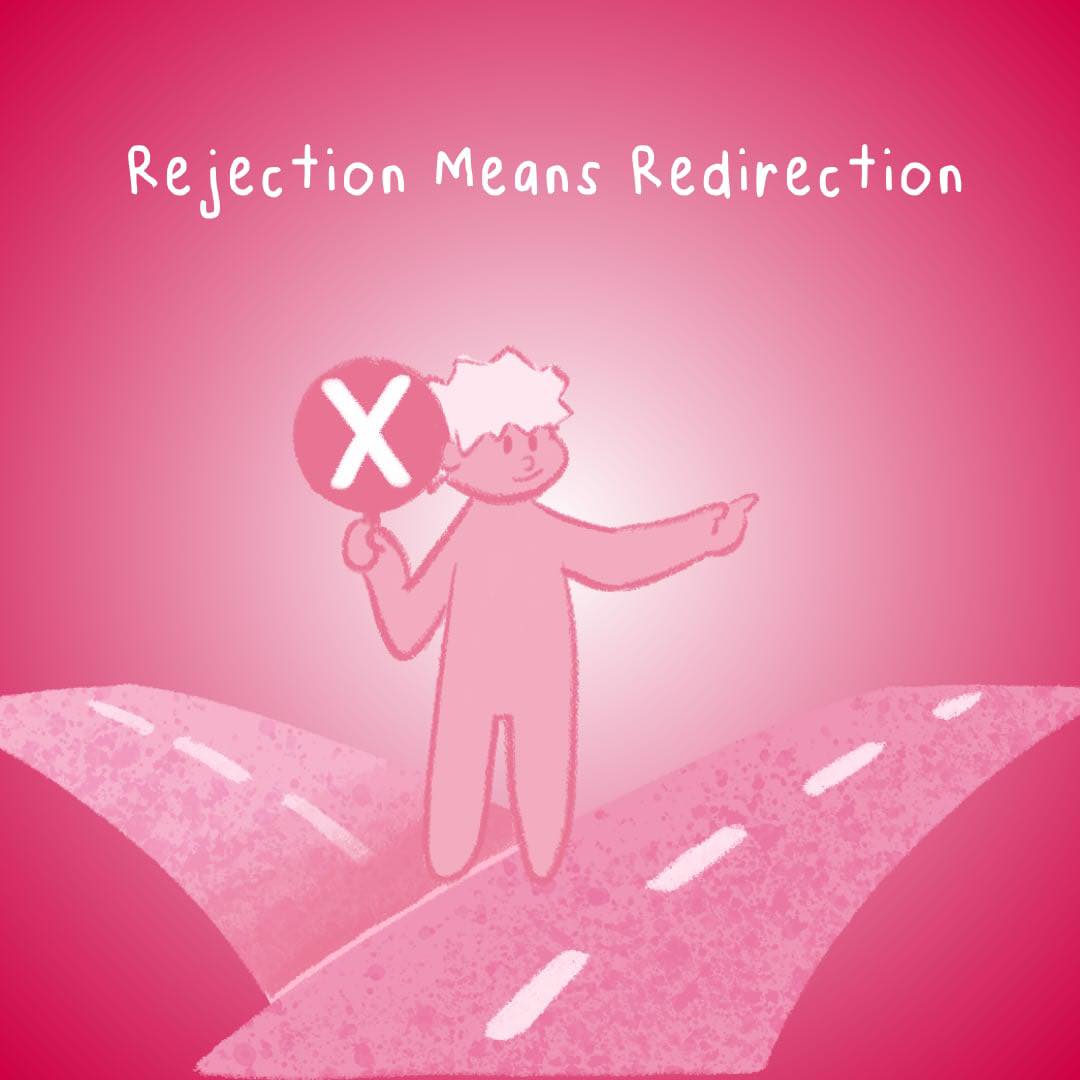Caption: Loren Mangahas Layout: Carl Carasco Rejection isn’t the end—it’s just a push toward something better. Every “no” you receive is a form of redirection, it pushes you away from things that aren’t meant for you, and leads you to greater horizons. Every setback, every ‘no,’ and every missed opportunity is actually making space for something better. Remember, every redirection leads you to the right place, somewhere that aligns with your purpose, your growth, and your true potential. Instead of dwelling, Trust that what’s meant for you will never pass you by. Rejection is not a sign of failure.
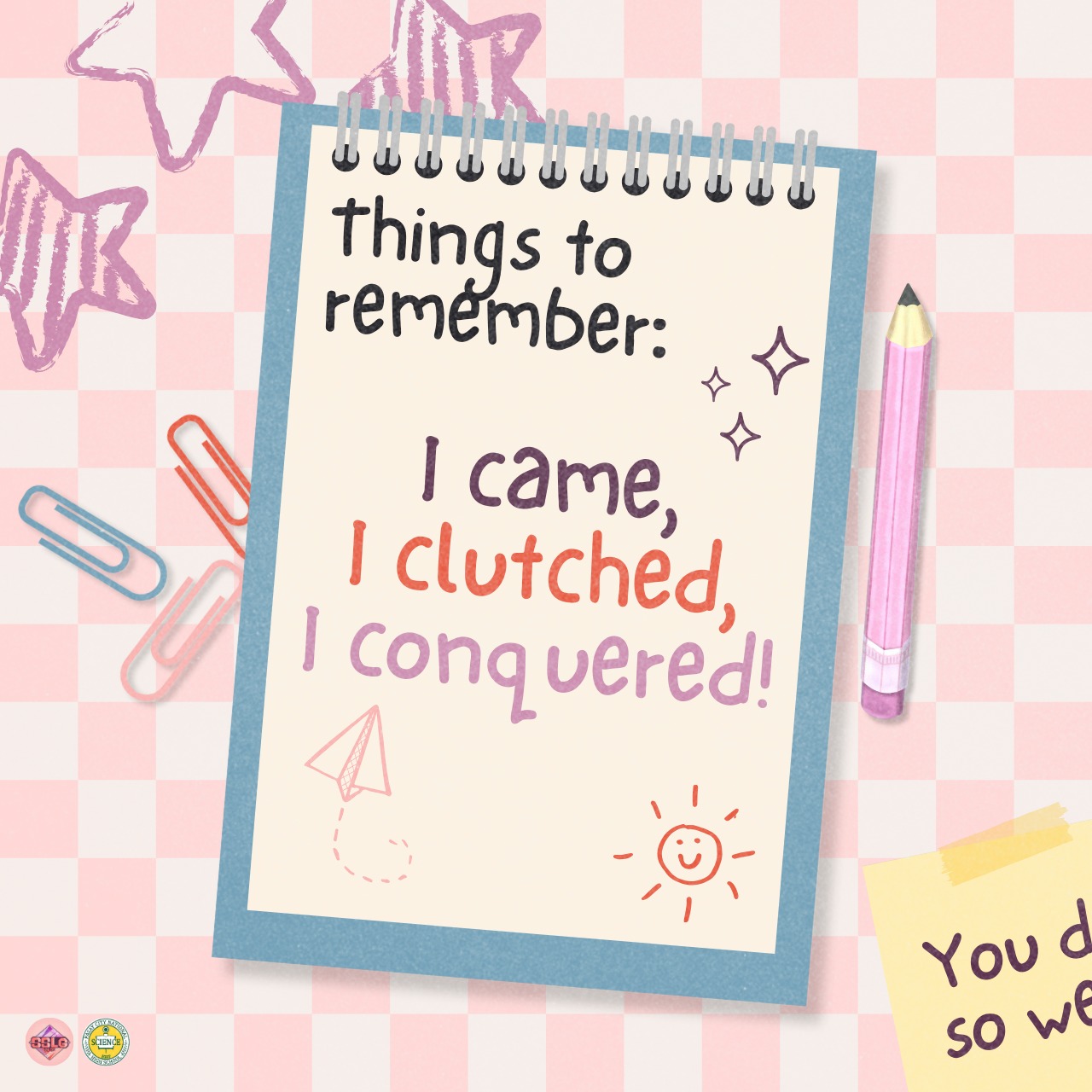
Due tomorrow, do it tomorrow?!
Due tomorrow, do it tomorrow?! Being a Pascian is already a challenging responsibility. As time goes on, the tasks only get tougher. Their number keeps increasing, and what were once power naps have become my daily sleep routine—six hours of rest now feels like a miracle. The tasks from each club are like a never-ending list of receipts, each with its own value and deadline. Every night, my Google Docs are buzzing with activity, with at least five tabs open at once. The sound of my fingers typing on the keyboard may seem soothing, but as the clock ticks on, it turns into a static that pulses in my ears. It’s hard, really. But I CAME here for a reason. I didn’t just end up here by chance; I’m here because I belong. These activities might keep me awake at night, but I won’t let that stop me. I can do this—I will do this. No matter how rushed it gets, I will deliver quality work. Despite the unstoppable tears and stress, I’ve CLUTCHED every responsibility that’s come my way. Everything is fine. Everything will be fine. Just a little more effort, and this school year will come to a close. I will definitely CONQUER any obstacles that come my way because, after all, I am a Pascian. This is just the beginning. Soon, I’ll look back at my failures and accomplishments, smiling, knowing that at the end of the day, I will be happily successful. Sincerely, Pascian 2024-2025
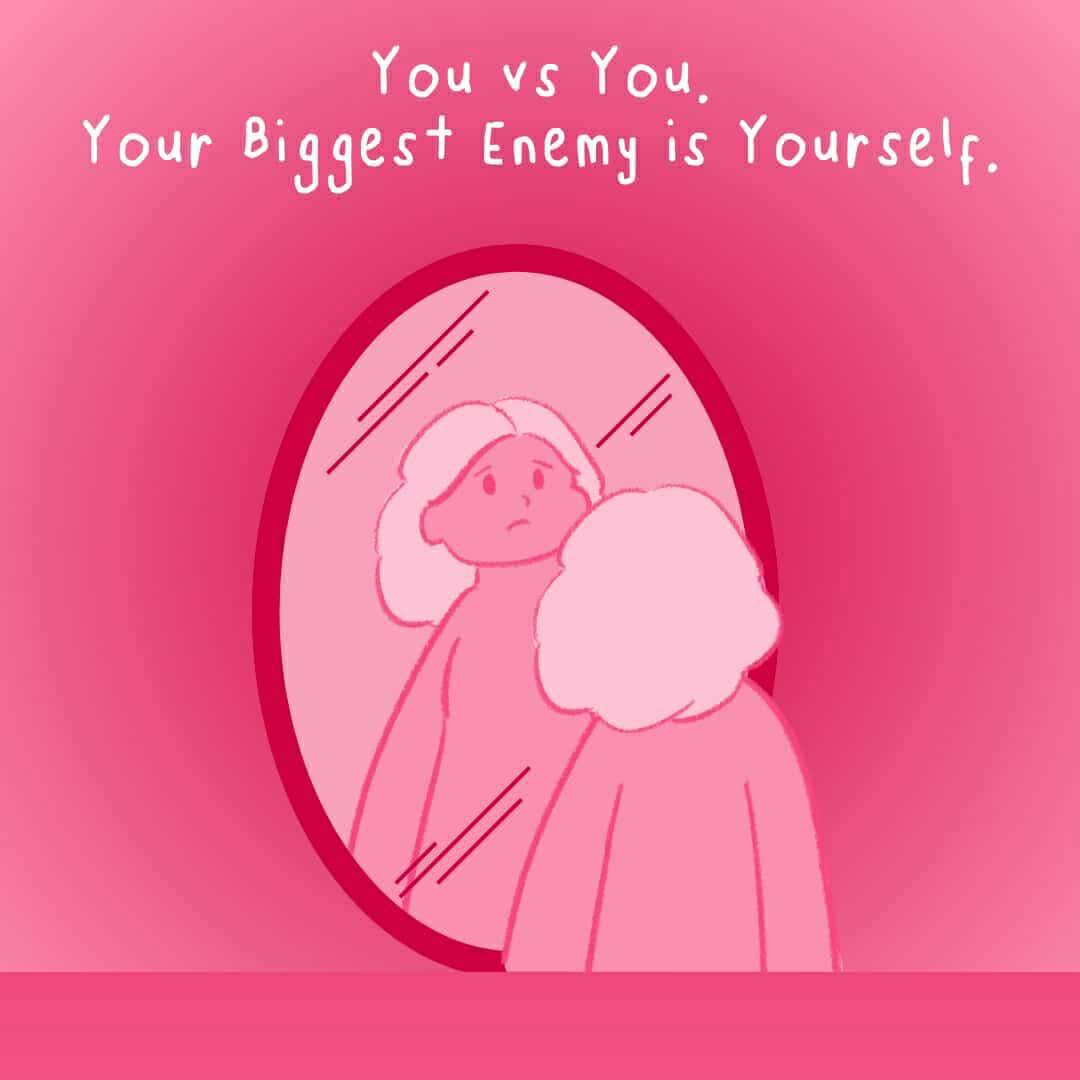
There’s nothing holding you back in life more than yourself.
Caption: Camille Atienza Layout: Carl Carasco There’s nothing holding you back in life more than yourself. The only person you need to beat is who you were yesterday. Every day is an opportunity to marvel at your own growth, sharpen your mind, and outwork the old you. Forget the noise, forget the competition—your only rival is the reflection staring back at you. Don’t waste energy competing with others. Find the parts of yourself that can grow, enhance your strengths, and turn your potential into something legendary. Now, sometimes, at night, when you think back, it might feel like you’re watching an old black-and-white movie of yourself. That’s proof of how far you’ve come. And the thing about progress? It never stops and it’s fantastic.
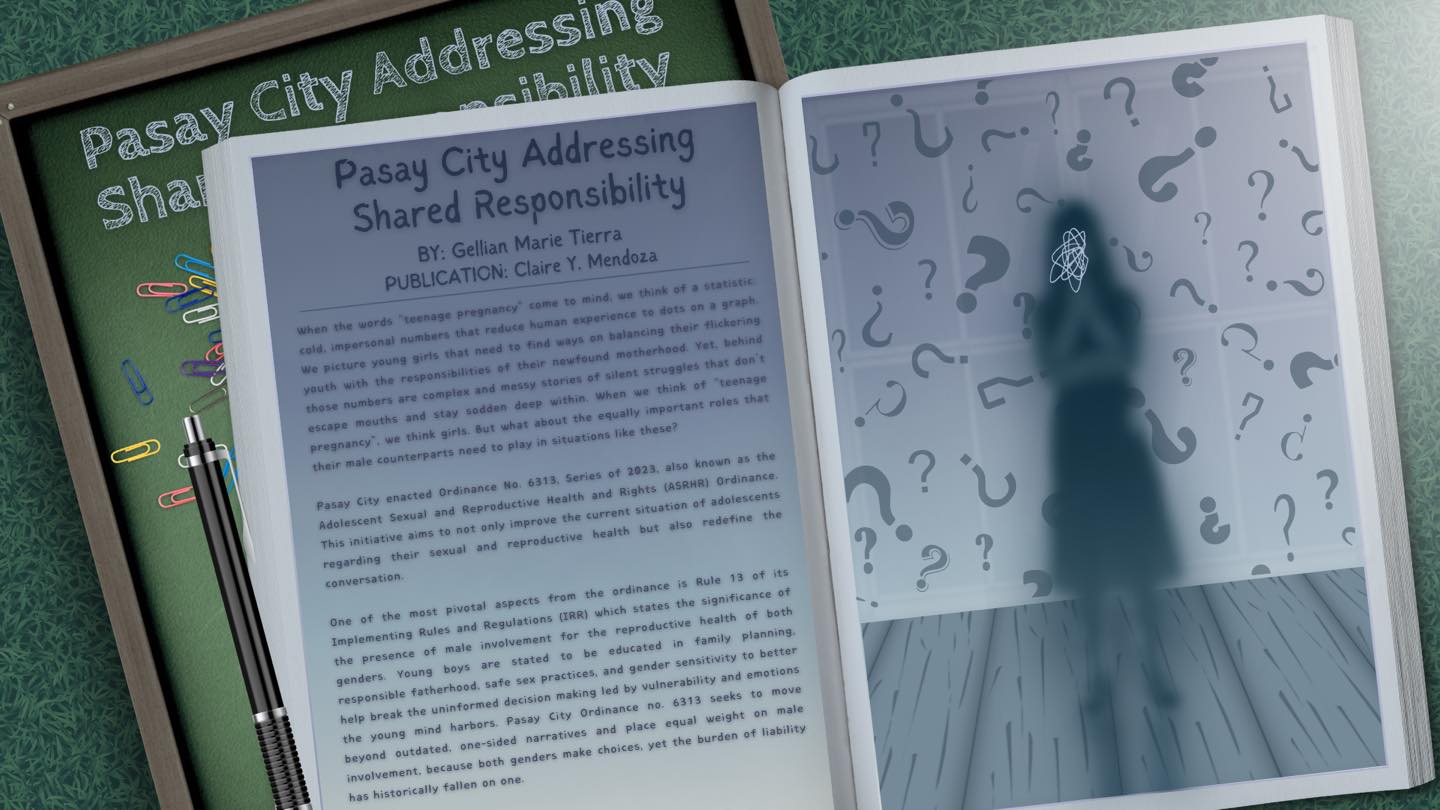
Pasay City Addressing Shared Responsibility
By: Gellian Marie TierraPublication: Claire Mendoza When the words “teenage pregnancy” come to mind, we think of a statistic: cold, impersonal numbers that reduce human experience to dots on a graph. We picture young girls that need to find ways on balancing their flickering youth with the responsibilities of their newfound motherhood. Yet, behind those numbers are complex and messy stories of silent struggles that don’t escape mouths and stay sodden deep within. When we think of “teenage pregnancy”, we think girls. But what about the equally important roles that their male counterparts need to play in situations like these? Pasay City enacted Ordinance No. 6313, Series of 2023, also known as the Adolescent Sexual and Reproductive Health and Rights (ASRHR) Ordinance. This initiative aims to not only improve the current situation of adolescents regarding their sexual and reproductive health but also redefine the conversation. One of the most pivotal aspects from the ordinance is Rule 13 of its Implementing Rules and Regulations (IRR) which states the significance of the presence of male involvement for the reproductive health of both genders. Young boys are stated to be educated in family planning, responsible fatherhood, safe sex practices, and gender sensitivity to better help break the uninformed decision making led by vulnerability and emotions the young mind harbors. Pasay City Ordinance no. 6313 seeks to move beyond outdated, one-sided narratives and place equal weight on male involvement, because both genders make choices, yet the burden of liability has historically fallen on one. An example of the absence of male involvement is the all-too-common misconception that teenage pregnancy is solely a “woman’s issue,” as if the responsibility should rest entirely on the young mother while the father remains a footnote in the narrative. This inaccuracy leads to the limited awareness and accountability of their male counterparts, reinforcing a toxic cycle. However, starting to address common issues that linger in this age group creates a difference, especially when handled early. The IRR, rather than merely addressing the consequences, forwards the idea of averting away from possible problems. It promotes early education on contraception, family planning, and the consequences of unprotected sex. Additionally, there are programs included that create discussions on gender sensitivity, life skills, co-parenting, and prevention of gender based violence. These efforts reinforce that reproductive health is a shared responsibility. The ordinance takes a proactive rather than a reactive approach by empowering young men with the right knowledge that can contribute to their character now and in the future, safer relationships and greater respect in partnerships, and the reduction of early pregnancies. The underlying message is how to lean on preventive measures rather than expecting a solution when irrevocable damage has been done. At its core, the ASRHR ordinance is not just a legal framework, it is an initiative by Pasay City and a catalyst for the progression of sexual and reproductive health education. It serves as a commitment to nurturing burgeoning minds with awareness, responsibility, and inclusivity. Because real progress is not about assigning blame, it’s about ensuring that everyone is equipped to traverse through complexities of relationships, decision making, and creating character with integrity and ethics.
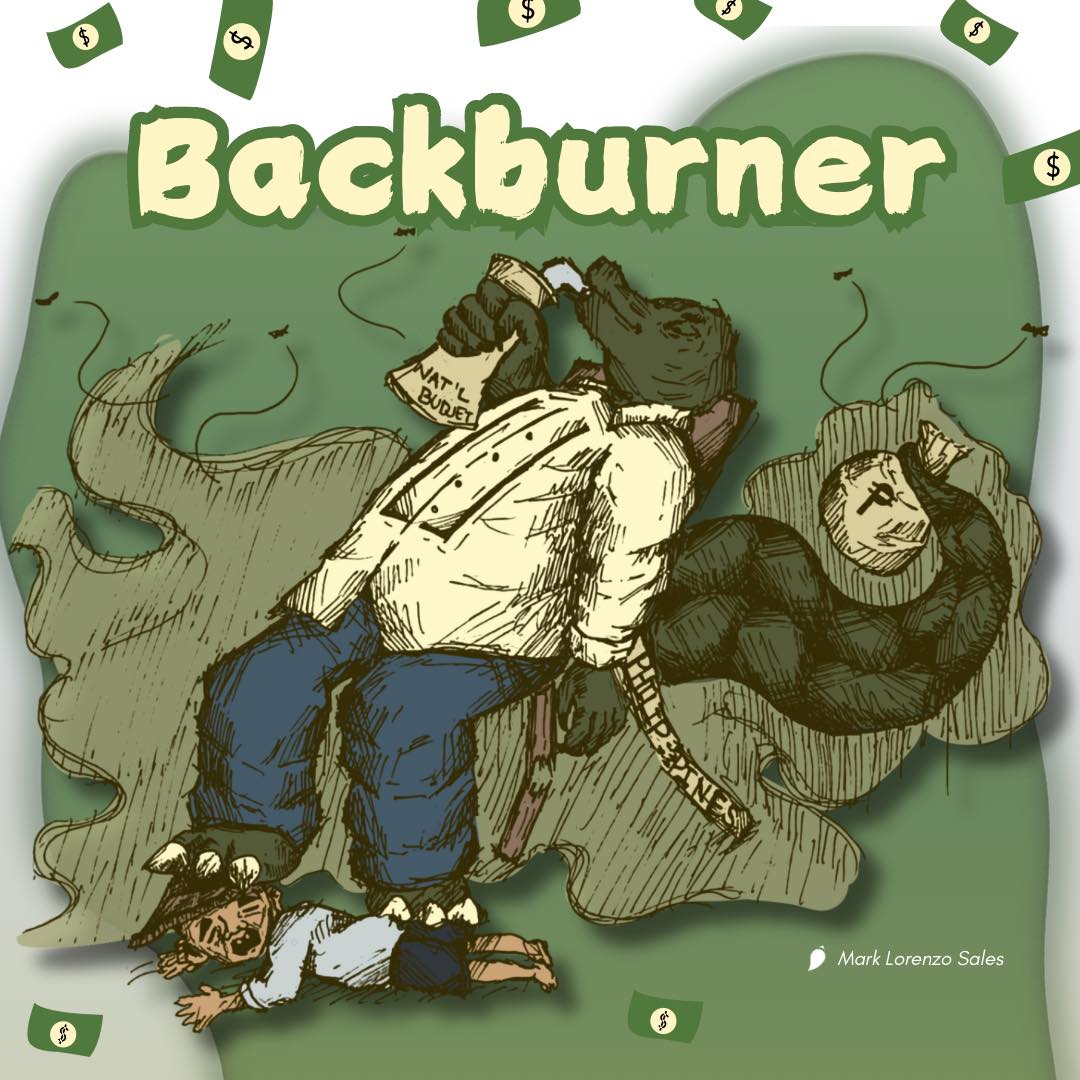
Backburner
By: Xhian Miguel AlsolaCartoon: Mark Lorenzo Sales Editor’s Note: The following article does not reflect the views and opinions of the Pasay City National Science High School faculty, administration, and stakeholders. In a recent ambush interview, President Ferdinand Marcos Jr. stressed that the 2025 national budget is sub-optimal and that the country is already working hard to remedy the problem. A problem that extends to the education sector as a result of the approval of the budget plan despite it being in complete shambles. The passing of the General Appropriations Act (GAA) 2025 was already a heated topic for controversy not too long ago. Marcos’ statement simply proves exactly why. It is never a good sign when even the president of the country admits that the national budget, the foundation of the nation’s future, is flawed. The Department of Education (DepEd) makes a great case for being the biggest victim, as the budget treats its title as being the top priority like a joke. Despite Marcos emphasizing several times that Philippine education must advance, DepEd fund allocation receives no significant increase. Expecting further development in the education sector when support stays stagnant is utter stupidity. After all, new output is impossible without new input. The future looks bleak as it is much too late for any budget amendments, coercing the authorities to scour for any and every possible source to boost funds for departments in need. This is the only way out, however, as the authorities must pull out all the stops and cover budget gaps by any means possible. It is inevitable that savings will be tapped into. Throughout the entire fiasco, the student body takes the brunt of the force. Students and scholars of the country have no need for a “sub-optimal” support system in budget form. The country must pull itself back up by recognizing its priorities and showing them through appropriate action. As of now, it is unclear whether the nation sees its students as the future or a secondary concern fit for the backburner.
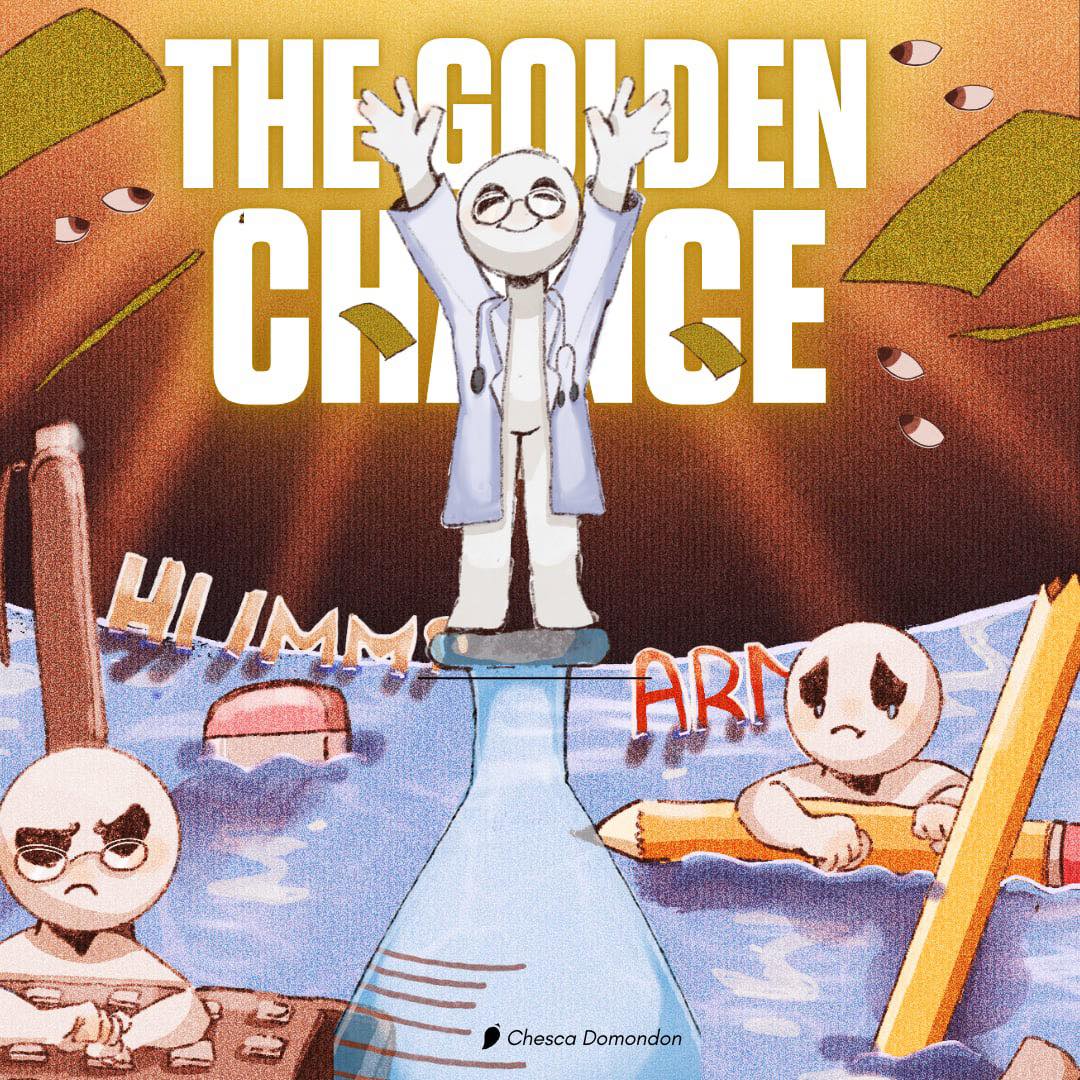
#NationalArtsMonth2025 | The Golden Chance
By: Darleene AnavisoCartoon: Chesca Domondon Every child possesses unique talents and aspirations. Yet, the Philippine government’s approach to education—particularly its focus on the Science, Technology, Engineering, and Mathematics (STEM) strand within the Senior High School (SHS) program—risks the potential of countless students. This bias, evident in funding allocation, scholarship opportunities, and even societal perception, is not just unfair; it’s a threat to the nation’s overall progress. The K-12 program, including SHS with its four tracks (Arts and Design, Sports, Technical and Vocational, and Academic—which includes STEM), aims to enhance the quality of education and provide new opportunities. However, the reality is far from equitable. The STEM strand consistently receives larger shares of the budget and scholarships, leaving other tracks struggling for resources and recognition. Big corporations and NGOs often prioritize STEM graduates for internships and entry-level positions, further perpetuating the perception that STEM is the only viable career path. This unfair treatment is deeply felt by students. Amanda Joy Villaroman, a HUMSS student, describes her frustration at the shortage of scholarships for humanities students, a sentiment echoed by countless others. The perception that STEM is the only valuable path is not only disheartening but actively detrimental to students’ aspirations and the nation’s future. While the government’s focus on STEM is understandable, given its importance in economic development, neglecting other strands creates a critical flaw. Critical thinking is not solely the domain of STEM; the arts, humanities, and vocational skills are equally crucial for a well-rounded and thriving society. How can we build a strong nation if we undervalue the skills needed to understand its social, cultural, and economic frameworks? The current system creates a frustrating disparity, where some students are equipped with complete resources while others struggle with deprivation. The rising cost of tuition further worsens this inequality. Scholarships are essential for many students, yet the current distribution system intensifies the existing bias. This lack of fair opportunity not only limits individual potential but also hinders the nation’s ability to cultivate a diverse and skilled workforce. STEM cannot stand on its own. It is not the only strand that is crucial; all of the strands are. They are connected with the humanities, social sciences, and arts, forming a complex and dynamic ecosystem of knowledge and innovation. The development of sustainable technologies requires not only scientific expertise but also a deep understanding of social and cultural factors that influence adoption and implementation. By embracing their connection, we can create a more holistic and ethical approach to addressing the challenges we may experience, making meaningful progress that can benefit us all. The solution is not to diminish the importance of STEM but to create a level playing field for all SHS tracks. This requires a fundamental shift in resource allocation, scholarship programs, and societal perception. According to the De La Salle University (DLSU) Research Congress, more people apply for STEM than other strands because it offers a pathway to high-demand careers with good salaries, provides valuable skills like critical thinking and problem-solving, and is considered crucial for driving innovation and technological advancements in today’s world. This pathway should not only be offered in STEM but also in every other strand. Every student deserves a fair chance, and every opportunity they encounter is a golden chance to shape their future and contribute to the nation’s progress. The government and private sectors must act decisively and create projects or programs such as equal funding allocation and diverse scholarships to ensure every strand has equal opportunities in both academic and work environments, making this golden chance available to all.
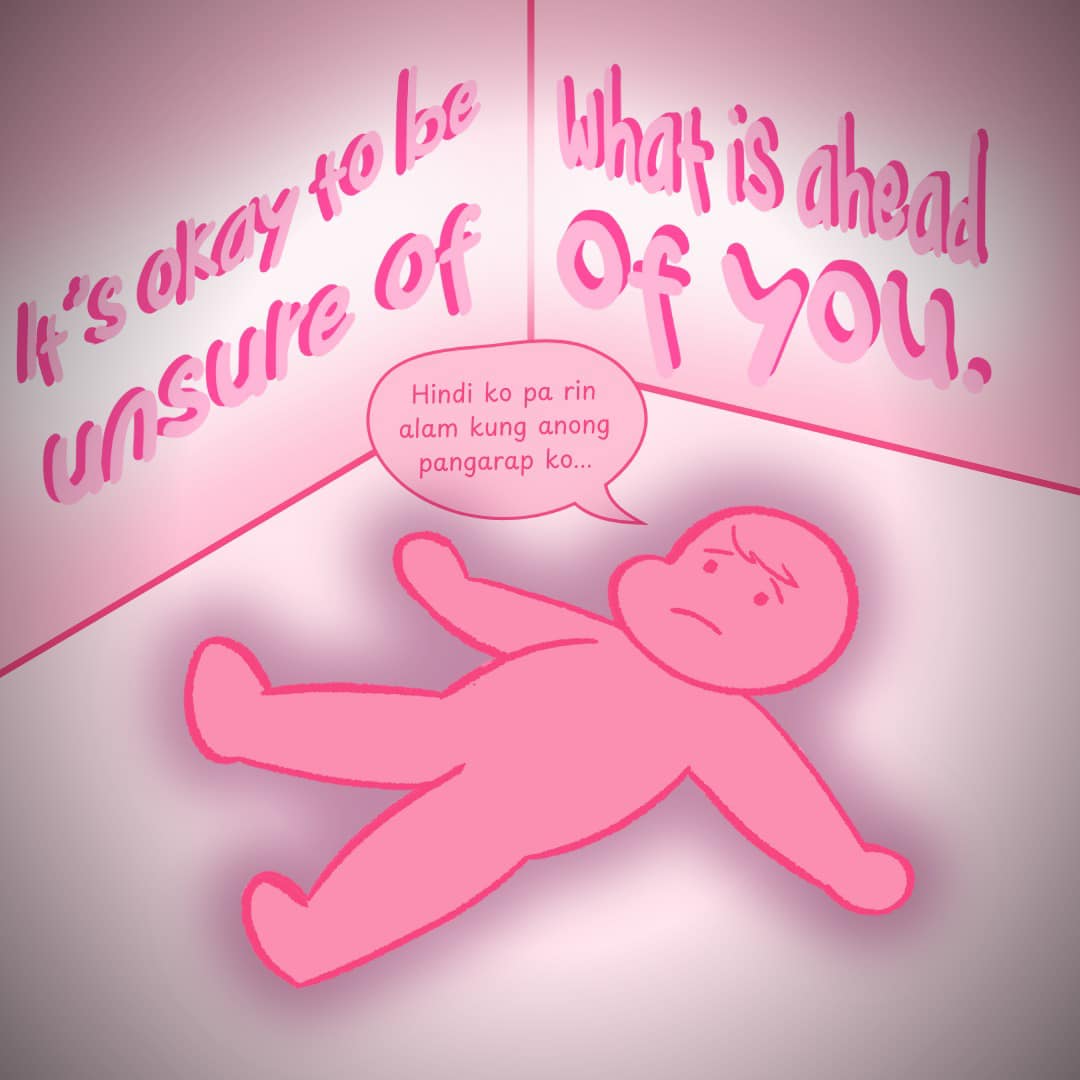
It’s okay to feel lost
Caption: Yasmine Resse RoselLayout: Carl Carasco and Ana Celso It’s okay to feel lost. It’s okay to not have everything figured out. Life isn’t a race, and everyone moves at their own pace. Just because others seem to have a clear path doesn’t mean you’re falling behind. Dreams don’t always come to us fully formed—they take time, experience, and self-discovery. If you find yourself unsure of what lies ahead, take comfort in knowing that uncertainty is not a sign of failure but a phase of growth. Embrace the process, explore different opportunities, and allow yourself to make mistakes and learn from them. Every step you take, even the small ones, brings you closer to where you’re meant to be. For now, be patient with yourself. Keep moving forward, and trust that your path will unfold in its own time.
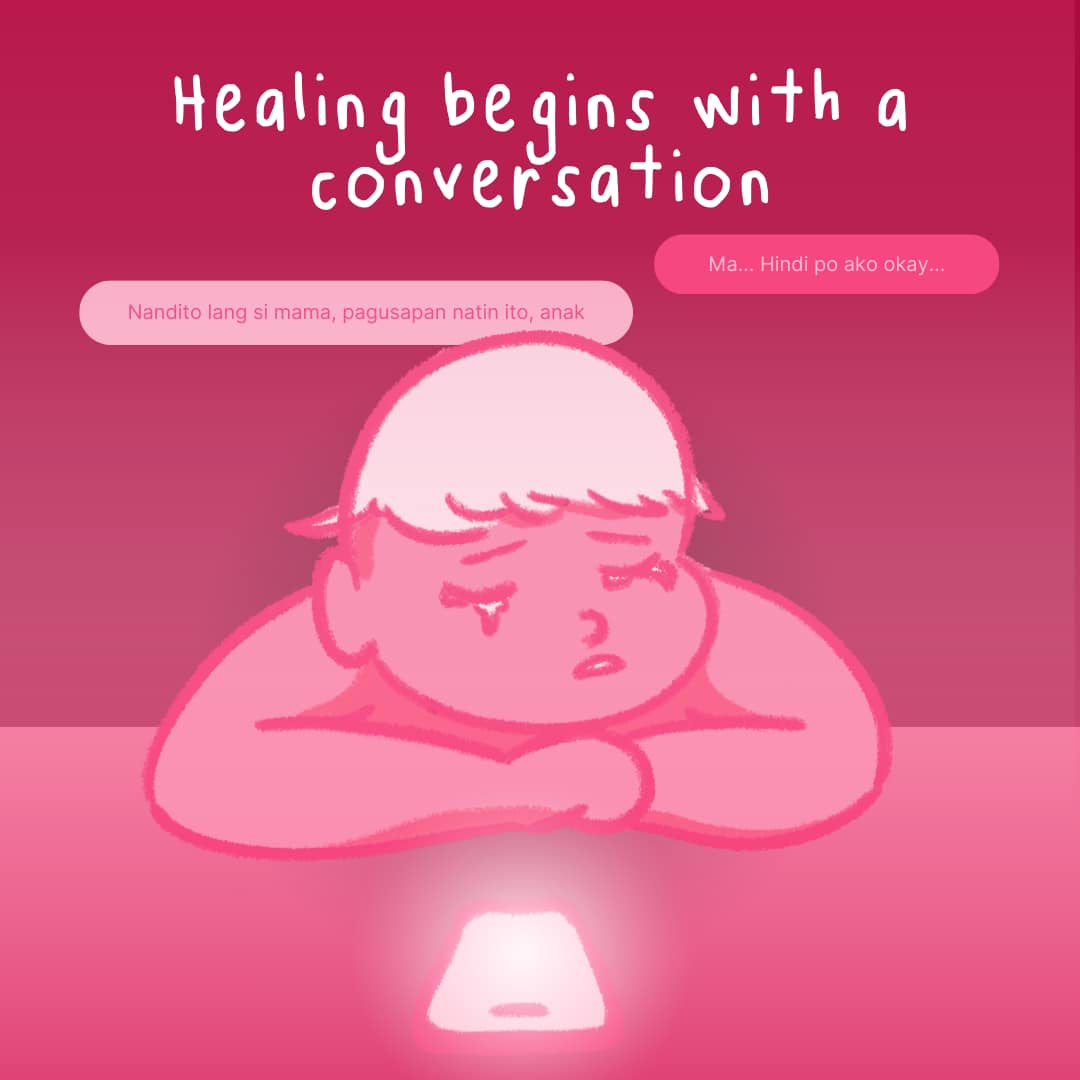
I’m not okay
Caption: Stefhanie Khaye BarcaLayout: Carl Carasco Sometimes, the hardest step is saying, “I’m not okay.”’ But that moment of vulnerability lies the beginning of healing. It’s not easy to open up, especially when it gets too much—with feelings being hard to express through words. Yet, telling others what you really feel allows others to truly see you, to understand what you’re going through, and to offer the support you deserve. Whether it’s a parent, a friend, or someone you trust, know that there’s always someone willing to listen and help. Healing starts with a simple conversation—one where you remind yourself that you do not have to face your struggles alone
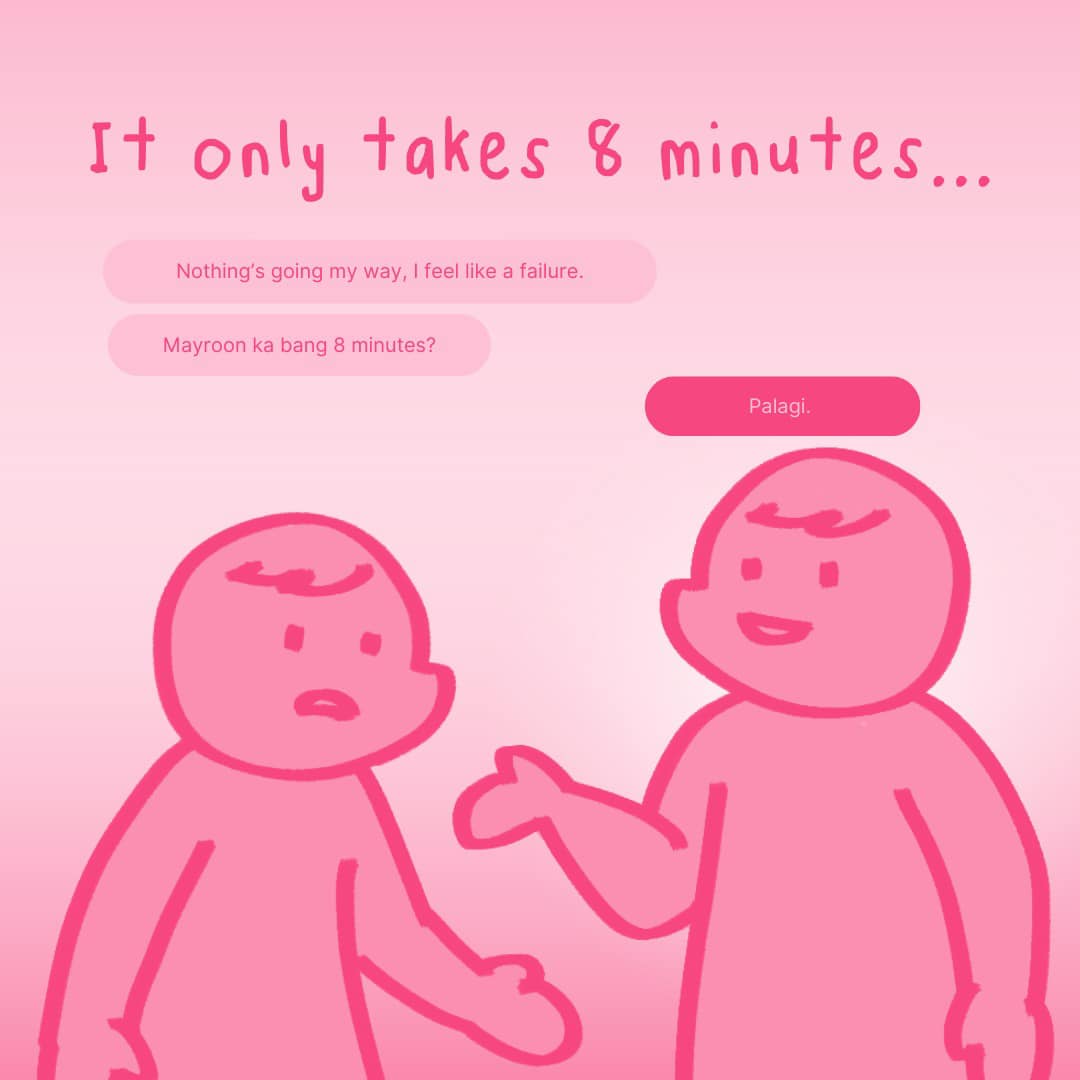
“It only takes 8 minutes.”
Caption: Camille AtienzaLayout: Carl Carasco and Yasmine Rosel According to Simon Sinek, dedicating eight minutes for such moments serves as a powerful reminder of the importance of prioritizing connection. It’s not about solving every problem but being there in the moment, fully attentive, and offering a sense of comfort and care. 8 minutes is a short period of time, yet it has the ability to evoke every feeling and emotion that fortifies a relationship’s ties. People often convince themselves that more time will become available eventually. Responsibilities and responsibilities frequently take precedence, leaving little time for genuine talks. However, when a loved one or friend is going through a difficult moment, the importance of simply being there cannot be overstated Spare 8 minutes out of your day to be there for someone. It’s a small effort with a big impact!

Let it all out. Crying cleanses your soul.
Caption: Loren MangahasLayout: Carl Carasco Crying releases the emotions we can’t express in words. Each tears are the emotions we carry in our heart, each tears make our heart lighter and stronger. It is in these moments of vulnerability that we find clarity and strength to move forward. Always remember that crying doesn’t make you any less of a person. It symbolizes how strong you are and makes us connect and understand our self-being. In these moments we cry, let us embrace the tears and always be reminded that we can always comeback stronger and face the world again




